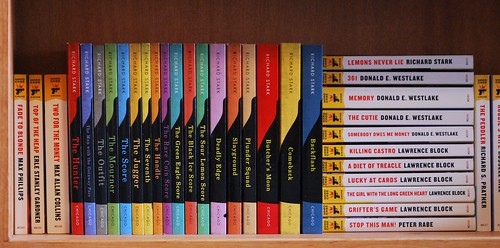As I've noted before, I usually try to keep my life as a blogger and my life as the promotions director of the University of Chicago Press separate. This blog is, after all, something I write on my own time about my life as a reader, and while my reading definitely informs the work I do at the office, they're separate worlds, and, by design, the blog reflects that.
But occasionally they overlap--and this is a very good week for that. So, with apologies for seeming to be shilling for my employers, four notes about Chicago books that I've had a hand in and am thus particularly excited about:
1 The fifth Parker novel,
The Score, is
the free e-book of the month from Chicago for September--and this time, like with the Anthony Powell giveaway back in December, it's free not just from the Press directly, but also from all the major e-book retailers. I've been writing about Richard Stark ever since I first started reading the Parker novels nearly four years ago; being part of bringing these novels back into print has been one of the things I'm most proud of in a twelve-year career in publishing.
The Score is a great place to start reading Parker: it's one of the most exciting books in the series, but it's also got a lightness of tone that's unusual and welcoming--there's none of the gaspingly brutal violence of, say,
Plunder Squad here. I'm confident that the thousands of people who download this freebie won't need much convincing to move from that to one of
the other nineteen Parkers that Chicago now has available. If you need more convincing, check out
my many posts about Stark in the archives, or visit
Ethan Iverson's checklist of Donald Westlake's complete oeuvre.
2 George Pelecanos's new novel,
The Cut, features a character who teaches literature to public high school students in DC . . . and one of the books on his syllabus is Stark's
The Hunter. After reading aloud the opening page, he asks the students what the description of Parker, all hands and shoulders and implicit violence, makes them feel:
"Way his hands are swinging," said another, "it's like he don't care about nothin."
"He doesn't belong in that suit," said William Rogers, aka Moony.
"Exactly," said Leo. "The suit doesn't fit him, both literally and metaphorically. It's a costume to him. He'd be more comfortable walking naked through a jungle. The Parker books are crime novels, but they're also about a man whose physicality stands in contrast to a working world that, at the time, had become increasingly mechanized and deskbound."
"I don't get what you're sayin, Mr. Lucas."
"Parker is a man of action. He's defined by what he does rather than what he says."
Later, in a touch I suspect Westlake would have appreciated, when the teacher asks the class what they liked about the book, a kid pipes up, "It's short."
3 Another book I had a hand in returning to print has just arrived in bookstores, and it couldn't be more different from Stark's work: Francoise Sagan's
A Certain Smile. Sagan's second novel (after the explosively successful
Bonjour Tristesse), it is, I think, better than her famous debut: its characters are more convincingly imagined, its prose--full of quotably pithy lines--more stripped-down, its world-weariness feeling a tad more earned. In
the Economist, Molly Young called it "a popsicle of a book," and that's not far off, if you can imagine a popsicle leavened with a delectable dash or two of bitters. As autumn draws in, what better way to spend some time than sighing over the prematurely cynical love affairs of a beautiful young French student? Lay in a stock of Gauloises and enjoy!
4 And, fnally, what is perhaps the book I'm most excited about this fall, Dmitry Samarov's
Hack: Stories from a Chicago Cab, should be showing up in bookstores everywhere any day now. I've been a fan for a few years now of
Dmitry's blog about the people he meets and the strange things he sees while driving a cab, and I'm pleased to have played a part in transforming that blog into a book. If you're fascinated by urban life, and you've always wondered about that slice of it that only cabbies see, this is the book for you: it's full of wonderful (and some horrible) anecdotes and unforgettable images of people with their guard down, revealing things to this stranger behind the wheel that, you sense, they don't even tell their closest friends. It's an amazing book, and it's powered by Dmitry's deep empathy: up against people at their worst day after day, he somehow keeps from being crushed. Indeed, what makes his stories stand out is that even as he marvels at oddity he never loses sight of the fact that it's
human oddity, and thus worthy of our forbearance and care.
Dmitry will be appearing
at a number of venues in Chicago this fall, including a launch party on October 1 at the Rainbo where I'll be one of the many readers (and certainly the least famous). And if you're on Twitter,
definitely follow him: you'll get plenty of late-night stories of unusual fares.
Publishing's a job, like any other. But once in a while, you simply feel lucky to be a part of it. With these books, that's definitely where I stand.

